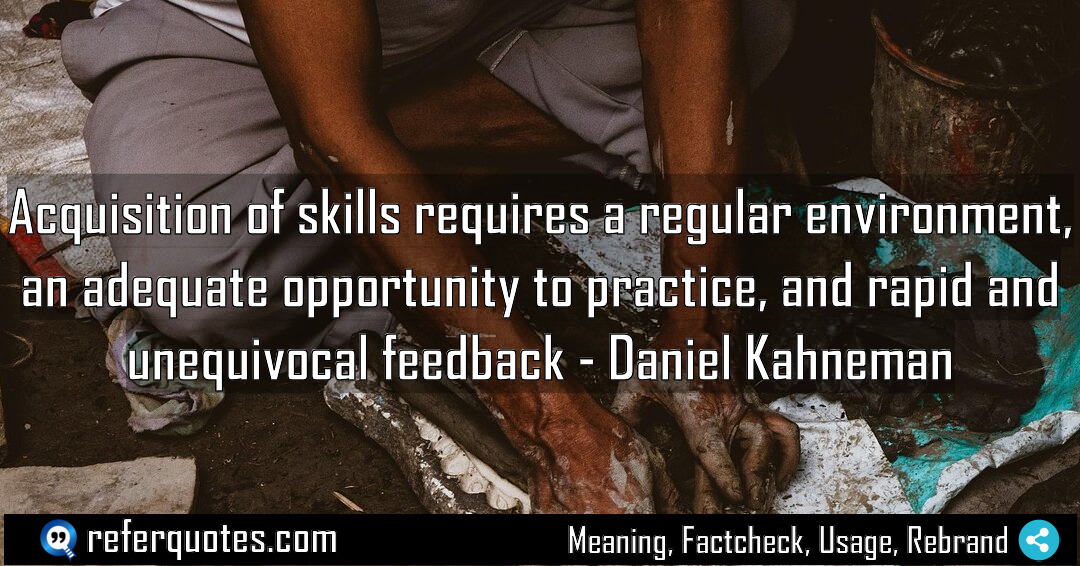You know, the idea that “Acquisition of skills requires a regular environment” is one of those concepts that seems obvious once you hear it, but it completely changes how you approach learning. It’s not just about putting in the hours; it’s about the *conditions* you create for those hours to actually count. Let’s break down why Kahneman hit the nail on the head with this one.
Share Image Quote:Table of Contents
Meaning
At its core, this quote is a simple, three-part recipe for genuine skill development. It’s the antidote to just “hoping” you’ll get better at something.
Explanation
Let’s get into the weeds on this. Kahneman isn’t just talking about practice. He’s talking about *effective* practice. The “regular environment” part is huge—it means the rules of the game can’t be changing on you. Think about learning to drive a car. The pedals are always in the same place, right? That consistency allows your brain to automate the process. Now, imagine if the brake and accelerator swapped spots randomly. You’d never build the skill.
Then you have “adequate opportunity to practice.” This is about volume, sure, but it’s more about the *right kind* of volume. It’s deliberate practice, not just mindless repetition.
But the real killer ingredient is “rapid and unequivocal feedback.” This is the part most people and companies get totally wrong. If you don’t know immediately, or very soon after, whether you succeeded or failed, your brain can’t make the connection. It’s like trying to learn golf in the dark. You swing, you hear a thud, but you have no idea where the ball went. Was it a perfect shot? A slice into the woods? Without that instant, crystal-clear feedback, you’re just swinging a club. You’re not building a skill.
Quote Summary
| Context | Attributes |
|---|---|
| Original Language | English (4148) |
| Category | Skill (471) |
| Topics | feedback (11), learning (219), practice (49) |
| Literary Style | practical (133) |
| Emotion / Mood | motivating (352) |
| Overall Quote Score | 83 (343) |
Origin & Factcheck
This wisdom comes straight from Daniel Kahneman’s 2011 magnum opus, “Thinking, Fast and Slow.” It’s a key insight from his research on expertise and intuition, debunking the myth that intuition is purely magical. It’s built on these three pillars.
Attribution Summary
| Context | Attributes |
|---|---|
| Author | Daniel Kahneman (54) |
| Source Type | Book (4761) |
| Source/Book Name | Thinking, Fast and Slow (54) |
| Origin Timeperiod | 21st Century (1995) |
| Original Language | English (4148) |
| Authenticity | Verified (4761) |
Author Bio
Dr Daniel Kahneman transformed how we think about thinking. Trained in Israel and at UC Berkeley, he built a career spanning Hebrew University, UBC, UC Berkeley, and Princeton. His partnership with Amos Tversky produced prospect theory and the heuristics-and-biases program, culminating in the Nobel Prize in Economic Sciences. He engaged broad audiences through bestselling books and practical frameworks for better decisions. He continued writing and advising late into life, leaving ideas that shape economics, policy, medicine, and management. If you want to dive deeper, start with the Dr Daniel Kahneman book list and explore his enduring insights.
| Official Website
Where is this quotation located?
| Quotation | Acquisition of skills requires a regular environment, an adequate opportunity to practice, and rapid and unequivocal feedback |
| Book Details | Publication Year: 2011; ISBN: 9780374275631; Latest Edition: Farrar, Straus and Giroux, 2013; Number of pages: 499. |
| Where is it? | Part III: Overconfidence, Chapter 22: Expert Intuition, Approximate page 233 (2013 edition) |
